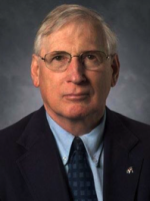Editor’s Note: Clifton A. “Cliff” Baile, a D.W. Brooks Distinguished Professor and GRA Eminent Scholar in Biotechnology at the University of Georgia, died Monday following a cerebral aneurysm. He was 74.
Patricia Thomas, the Knight Chair in Health and Medical Journalism at UGA, reflects on Baile’s work in this GHN article.
It is a truth rarely acknowledged that most university faculty members don’t know what their colleagues do, nor are they motivated to find out.
This is what Clifton A. “Cliff” Baile was up against when he set out to organize the University of Georgia’s Obesity Initiative in the summer of 2011. The plan involved mobilizing hundreds of researchers in dozens of departments, spread out across the enormous Athens campus, to combat soaring obesity rates in Georgia.
Many of these researchers, teachers and community outreach experts had never met. All were busy with their own work. If asked, most would have said they could not possibly join another committee or take on anything new.
But Cliff, already a successful scholar, corporate leader and entrepreneur — decked out with as many academic honorifics as a four-star general has medals and ribbons — was a hard man to turn down.
Cliff had a lot of ringmaster presence: tall, with well-barbered white hair, a deep voice and a mischievous twinkle in his eye. I never saw him in a top hat and tails, but he could have carried it off.
Like any good impresario, he knew how to do his homework. Minutes into our first conversation, Cliff had discovered which people we both knew in Boston — though our years there did not overlap. He also understood that people learn most of what they know about health, including nutrition and physical activity, from the media. He saw news organizations, such as Georgia Health News, as potential friends of the scientific enterprise. He knew reporters were not the enemy.
I direct a health and medical journalism graduate program at UGA, and students do hands-on reporting in Georgia. They were already generating considerable coverage of obesity’s impact on individuals, communities and the economy. If what Cliff proposed became a reality, and UGA threw its resources at this growing problem, there would be even more stories to tell.
Of course I said “yes” to Cliff and signed up with the Obesity Initiative. Since 2012, I’ve participated in teams focused on maternal and childhood obesity, community health and persuasive communication.
All told, the Obesity Initiative now has 130 UGA faculty working together in 14 teams. These teams work on grants, experiments and interventions dealing with virtual reality, the basic science of metabolism and genetics, clinical research on diet and physical activity, community walking programs and more.
When these groups convened, in conference rooms scattered across the campus, Cliff and his program manager, Diane Hartzell, were almost always there. If it was lunchtime, they brought pizza and fresh fruit. If the conversation wandered, Cliff guided it back on track. If spirits flagged because a grant proposal was turned down, Cliff got people fired up to try again.
These are the most diverse groups of teachers, researchers and extension experts that I’ve found on this campus or any other.
My guess is that Cliff recruited all these folks the same way he did me: by taking a genuine interest in them, both professionally and personally, and making them want to run away and join his circus.
It was a gift he had, even without the top hat.

